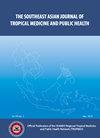The Ameliorative Effect of Honey on Lead (Pb) – Induced Nephrotoxicity in Male Wistar Rats
IF 0.1
4区 医学
Q4 INFECTIOUS DISEASES
Southeast Asian Journal of Tropical Medicine and Public Health
Pub Date : 2023-07-09
DOI:10.9734/ajmah/2023/v21i9871
引用次数: 0
Abstract
Exposure to lead (Pb2+) is known to portend serious damaging effects on the kidneys which are central to drug and substances excretion. Hence, a natural chelating agent such as honey is sought to attenuate the deleterious effects of lead induced renal damage. This study investigated the ameliorative influence of honey on renal function in lead – induced nephrotoxicity in wistar rats. Twenty-four (24) adult male Wistar rats (weighing 180-200g) were divided into four groups of six (n=6) rats each. Group 1: served as (negative control) and received distilled water and rat chow ad libitum. Group 2: served as positive control received 10mg/kg bw of Lead. Group 3: Received 2mls of 50% dilution of honey. Group 4: Received 10mg/kg bw of Lead + 2mls of 50% dilution of honey. All treatments were daily administered orally using oral gavage and lasted for 28 days. At the end of drug administration, experimental animals were anaesthetized using ketamine. Cardiac puncture was used for blood collection for analysis of renal function parameters. Significant (p<0.05) elevations in the serum potassium, uric acid, urea and creatinine were observed for the lead (Pb) treated group compared to the control. However, there were significant (p<0.05) decrease in the serum levels of sodium, potassium, uric acid, urea and creatinine in the groups treated with honey alone and honey + lead (Pb) when compared with the lead (Pb) treated group. These results strongly suggest a possible tubular disruption and consequent alteration of ionic pumps, and ion channels within the renal tubules due to lead (Pb) exposure. This clearly points to the fact that honey may possess anti-inflammatory and antioxidant properties. It can be concluded that oral administration of honey confers a protective and ameliorative potentials against heavy metals (lead) induced kidney dysfunction in experimental animal models. However, lead (Pb2+) toxicity may seem to possess inhibitory properties on the renal Na+/K+ ATPase; because of reduced serum sodium with increased serum potassium levels recorded in this study.蜂蜜对铅致雄性Wistar大鼠肾毒性的改善作用
已知暴露于铅(Pb2+)会对肾脏造成严重的破坏性影响,肾脏是药物和物质排泄的中心。因此,一种天然的螯合剂,如蜂蜜,正在寻求减轻铅引起的肾损害的有害影响。本研究探讨了蜂蜜对铅致肾毒性大鼠肾功能的改善作用。取24只体重180 ~ 200g的成年雄性Wistar大鼠分为4组,每组6只(n=6)。组1:作为阴性对照,随机给予蒸馏水和大鼠饲料。第二组:作为阳性对照,注射铅10mg/kg bw。第三组:给予50%稀释蜂蜜2ml。第4组:给予铅10mg/kg bw + 50%稀释蜂蜜2ml。所有治疗方法均为每日灌胃,连续28 d。在给药结束时,实验动物使用氯胺酮麻醉。心脏穿刺采血分析肾功能参数。与对照组相比,铅(Pb)治疗组血清钾、尿酸、尿素和肌酐显著(p<0.05)升高。与铅处理组相比,蜂蜜单独处理组和蜂蜜+铅处理组血清钠、钾、尿酸、尿素和肌酐水平均显著(p<0.05)降低。这些结果强烈提示,由于铅暴露,肾小管内的离子泵和离子通道可能发生破坏和随之改变。这清楚地表明,蜂蜜可能具有抗炎和抗氧化的特性。由此可见,在实验动物模型中,口服蜂蜜对重金属(铅)所致肾功能障碍具有保护和改善作用。然而,铅(Pb2+)毒性似乎对肾脏Na+/K+ atp酶具有抑制作用;因为在这项研究中记录的血清钠降低而血清钾水平升高。
本文章由计算机程序翻译,如有差异,请以英文原文为准。
求助全文
约1分钟内获得全文
求助全文
来源期刊

Southeast Asian Journal of Tropical Medicine and Public Health
PUBLIC, ENVIRONMENTAL & OCCUPATIONAL HEALTH-INFECTIOUS DISEASES
CiteScore
0.40
自引率
0.00%
发文量
0
审稿时长
3-8 weeks
期刊介绍:
The SEAMEO* Regional Tropical Medicine and Public Health Project was established in 1967 to help improve the health and standard of living of the peoples of Southeast Asia by pooling manpower resources of the participating SEAMEO member countries in a cooperative endeavor to develop and upgrade the research and training capabilities of the existing facilities in these countries. By promoting effective regional cooperation among the participating national centers, it is hoped to minimize waste in duplication of programs and activities. In 1992 the Project was renamed the SEAMEO Regional Tropical Medicine and Public Health Network.
 求助内容:
求助内容: 应助结果提醒方式:
应助结果提醒方式:


